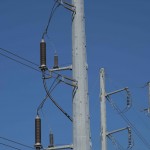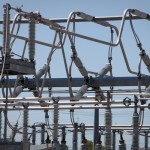What’s Behind Energy in America: Q&A with Yul Kwon of ‘America Revealed’

Image courtesy of PBS/America Revealed
Yul Kwon is the host of a new PBS series that peels back the layers of our energy, foodn transportation and manufacturing.
We all use electricity – but what systems are in place to make sure it’s there when we need it? How does the whole grid work in the first place? Those are questions examined in the latest episode of a new series on PBS called America Revealed, which aims to peel back the layers of how complex systems like energy work in the U.S. Show host Yul Kwon spoke with StateImpact Texas lead station KUT Austin this week about the program. Kwon says the show looks at the massive systems that we use everyday in the U.S. but that most people don’t understand – or just don’t think about.
You can watch the ‘Electric Nation’ episode of America Revealed Wednesday night at 9 pm on KLRU and other PBS stations in Texas.
Q: Green energy has become a larger and larger thing in Texas. We are the top wind energy producer in the country. How have you seen, as you were producing your program, the green energy movement put its stamp on the electrical system?
A: It’s a making a huge impact. Again, we go through the evolution of how our energy grid developed, how the electric power grid developed. And you know, to this day, coal is still the dominant source of energy. In terms of producing power, it accounts for about half of the total power production. The average American uses about four tons of coal every single year. So, that’s not going to change any time soon. But, at the same time, we are seeing this huge growing awareness of the need to produce more sustainable resources.

Image courtesy of PBS/America Revealed
Host Yul Kwon rides along as turbine cowboys service a wind farm in Goldendale, Washington.
And it’s interesting because we actually go into talking about Thomas Edison, who is probably more responsible for our energy-demand culture than anyone on the planet because he created, essentially, the modern electric grid. Even he recognized, back in the day 100 years ago, that this was not sustainable. He wrote a letter to Henry Ford, which we talk about, where he said that we should not be using these finite resources. We should be turning to the renewable sources like wind, solar and water to provide this. So, we go into the story of how our current energy grid exists, but what are some of the things that are changing? One of the things that we try to highlight is, you know, we go to this one dairy farmer in Vermont who is producing cow power. He’s taking all the manure, he’s literally shoveling manure, and converting that into a source of energy. We go to an African-American church congregation in D.C. that installs solar panels on top of their roof. At the end of the day, they are barely making a dent in the whole bucket. You would have to get something like 4 million cows in order to produce enough electric power that would equal one nuclear power plant. But what it really is, it’s a growing awareness. These people are trying to take leadership within their communities to get us all thinking about what are the individual choices that we can make to make a difference on a national scale. I think those are the most interesting questions in the energy challenge today.
Watch America Revealed – Preview on PBS. See more from America Revealed.
Q: Due to regulations and natural gas prices, new coal generation in Texas is essentially dead. Do you find the same thing across the country?
A: That’s interesting because natural gas is obviously just a huge boom time right now. And even since we finished production of the show itself, natural gas prices have plummeted. They are now at decade lows, below $2 per British thermal unit. It’s a huge opportunity. But at the same time, we haven’t built out the infrastructure to completely take advantage of this right now. We are at an interesting space in our historical development, where we have this glut of natural gas, but we don’t have the ability to fully harness it. One of the side effects of this is that coal production has radically ramped down. It’s not as if a lot of the producers can really just cut down on natural gas production, because natural gas is a side product of drilling for oil in lots of cases. So, it’s interesting to see what will happen long-term. I do think at some point we will build out the infrastructure we need in order to fully harness this. For us, as a country, I think that’s a huge benefit that we will enjoy, because it will result in lower energy prices and energy independence. But we still have a while to get there.

Image courtesy of PBSAmerica Revealed
Host Yul Kwon gets harnessed in before heading out on a wind turbine in Washington.
Q: Last year Texas was extremely close to maxing out the electrical grid and going into rolling blackouts. How is the national grid doing in terms of dealing with the upcoming summer and being prepared to meet the huge energy needs?
A: I think it’s still going to be a challenge. Again, one of the recurring themes you see across the series is that once you build out infrastructure it becomes very difficult to change it, or upgrade it or to increase capacity. You see it happen in our transportation episode. You see it happen in the energy episode. And what’s interesting, if you look at it from a global level, a lot of times countries or parts of the world that don’t have the infrastructure to begin with are in some sense able to leapfrog in terms of technology. If you are just looking at, for example, transportation, we have this enormous rail system, but it’s not very good at moving people around the country. That’s because once you build it out it’s hard to change it. If you go to countries in post-World War II Europe or in Asia, where they started from scratch, and they are able to build these world-class rail systems, like the Euro rail or high-speed rail in China and Japan. And that kind of puts our country to shame. To a certain extent that’s kind of similar to the energy realm as well. It’s going to take us a while to build out the additional capacity to leverage a lot of the new sources of energy that we are seeing. But it’s not going to happen overnight.
It’s funny you should mention power outages because one of the great stories that we cover in this next episode on energy is what happened back in 2003 when there was a massive power outage in the northeast portion of the country, and, basically, there were about 40 million Americans who went without power. And we go into this story about, ‘How could this happen? How could you have such a massive blackout?’ And it turns out the cause was a very innocuous thing that you would never imagine. Essentially, what happened was that someone forgot to trim a tree so when that summer — it was a hot summer — people were turning on the air conditioning and the power lines started sagging from the additional power flowing through them, and one of the lines started sagging and hit a limb of a tree that hadn’t been cut down on schedule. So, that caused a trip of that line which caused the power to trip across all the other lines, and pretty soon you had this cascading effect that left a huge portion of the country without power. So, one of the things that we are examining through this series are, how these systems, on one hand, are minor miracles because, for the most part, they work. If you actually think what it takes to make them work on a daily basis, it is pretty amazing. At the same time a lot of them are reaching the point of capacity. They are reaching the point where a small error can cause the whole thing to go down. So, it is really interesting to see how that system has evolved and how on a larger level we still deal with these basic vulnerabilities.

